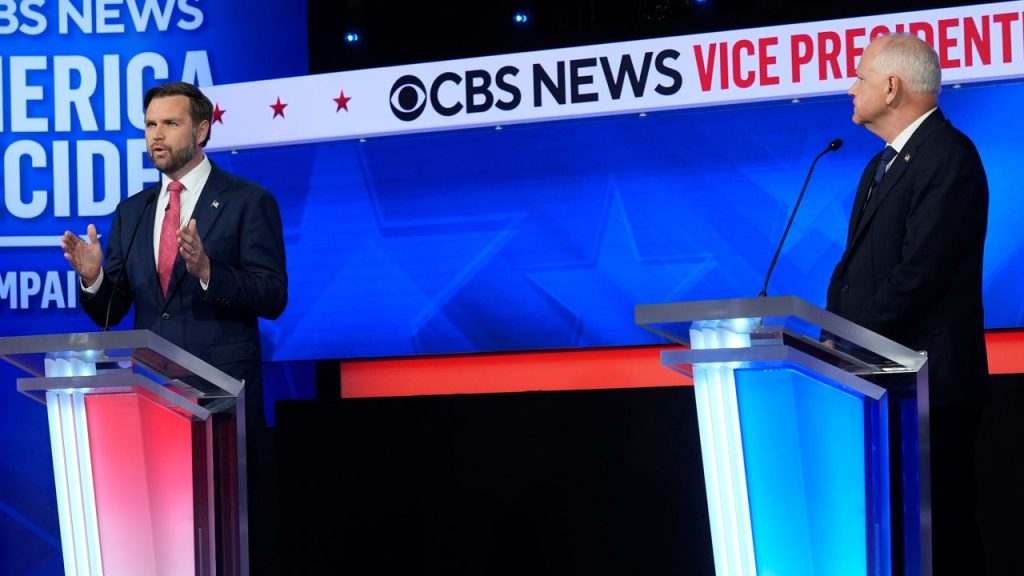Mixed Reactions from Viewers Following VP Debate Between Tim Walz and JD Vance
3 min read

A recent CNN instant poll indicates that registered voters who watched the vice presidential debate between Tim Walz and JD Vance found themselves divided on which candidate performed better. The debate, held on Tuesday, resulted in more favorable perceptions of both candidates among viewers compared to their pre-debate opinions.
According to the poll conducted by SSRS, 51% of viewers believed Vance did the better job during the debate, while 49% favored Walz. This marked a shift from pre-debate expectations, where 54% of viewers anticipated Walz would outperform Vance. Despite the close results, Walz is perceived more positively overall, with viewers seeing him as more in touch with their needs and vision for the country. In contrast, Vance, who faces a significant image deficit among the electorate, managed to improve his standing by defending his running mate effectively.
Both candidates garnered substantial approval ratings, with viewers expressing confidence in their qualifications for the presidency if necessary. Notably, nearly all voters who watched the debate indicated that their opinions had not shifted enough to change their votes.
The poll results showed a stark contrast to previous high-profile debates this election cycle. For instance, during the June debates between Donald Trump and Joe Biden, two-thirds of viewers felt Trump had outperformed Biden. Similarly, in the September debate between Trump and Kamala Harris, 63% thought Harris had the upper hand. This year’s VP debate was notably split along party lines: 90% of Trump supporters favored Vance, while 82% of Harris supporters deemed Walz the winner.
It’s important to note that the views reflected in this poll are limited to those who watched the debate and do not represent the broader voting public. The audience was slightly more Democratic-leaning, with a 3-point advantage over Republican-aligned viewers, which differs from the more GOP-leaning audiences of the presidential debates.
Following the debate, 59% of viewers reported having a favorable opinion of Walz, an increase from 46% before the event. Conversely, Vance’s ratings remained relatively neutral post-debate, with 41% viewing him favorably compared to 44% unfavorably. This marked an improvement for Vance, who started with only 30% favorable opinions and 52% unfavorable.
Among different demographics, Walz’s favorability increased significantly among women, while Vance saw similar gains across genders. Notably, 21% of Trump supporters who tuned in now have a favorable view of Walz, whereas Vance’s favorability with Harris supporters stagnated at just 8%.
In a pre-debate CNN poll of all Americans, Walz had a slight edge with 36% favorable and 32% unfavorable ratings, while Vance’s ratings were more negative at 30% favorable and 42% unfavorable.
Regarding qualifications, 65% of viewers now believe Walz is suited to serve as president, while 58% feel the same about Vance. Prior to the debate, those numbers were 62% for Walz and 50% for Vance. Additionally, viewers felt Walz was more in touch with their needs, leading Vance by a margin of 48% to 35% on that front. This reflects a level of positivity that has been rare in this election cycle.
A notable gender gap emerged, with female voters favoring Walz significantly: 50% identified more with his vision for America, compared to just 36% for Vance. Male voters were more evenly split, with 47% supporting Walz and 43% Vance.
Viewers also had mixed opinions on how well each candidate defended their running mate, with a slight majority (37% to 33%) believing Vance did a better job than Walz. Among Trump supporters, 70% felt Vance excelled in this area, while 57% of Harris backers thought Walz performed better.
Crucially, only 1% of viewers indicated that the debate changed their voting intentions, suggesting that both candidates retained their respective bases without swaying undecided voters.
The CNN poll, conducted via text message among 574 registered U.S. voters who watched the debate, provides a snapshot of audience opinions but does not represent the broader electorate. The margin of sampling error for the debate watchers is plus or minus 5.3 percentage points.